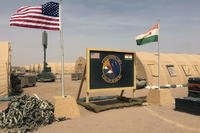If Congress was frustrated by the 2010 Quadrennial Defense Review (QDR) for advancing a do-it-all approach to strategy, it should be equally disappointed by the Independent Panel’s review of the QDR.
The Independent Panel, a blue-ribbon commission of leading defense experts, serves a valuable purpose: it acts as a check on the Defense Department’s often-opaque internal deliberations that shape defense strategy and capabilities. Moreover it benefits from being conducted outside many of the political and bureaucratic constraints that inhibit frank discussions of and innovative proposals for critical problems, such as ballooning personnel costs and questionable acquisition policies. But the Independent Panel failed to perform its most important function: critiquing the defense strategy laid out in the QDR.
The essence of strategy is prioritization. In a resource-constrained environment, the United States cannot afford to confront every global challenge or purchase capabilities for every contingency. One major criticism of the 2010 QDR was that it failed to identify clear priorities. The primary objectives it laid out to shape the force (such as “prevent and deter conflict” and “prepare to defeat adversaries and succeed in a wide range of contingencies”) were all-encompassing and abstract enough to justify virtually any investment or activity.
At the same time, demands on the force and pressures on discretionary spending from mounting deficits suggest a need to make some hard choices; Secretary of Defense Robert Gates announced on Monday new plans to trim the Defense Department bureaucracy in hopes of warding off potentially more drastic cuts imposed by Congress. This is the time for the department to be more discriminating, not more expansive, in its capability investments.
Yet the Independent Panel recognized no such limitations. It identified broad “security interests” (such as “providing for the global ‘common good'”) and explicitly rejected any retrenchment from a position of global leadership. Rather than focusing on specific priorities, it recommended doing more of everything. It calls for maintaining the end-strength of the recently expanded Army and Marine Corps while also modernizing and replacing hardware on a one-to-one basis.
The panel’s primary response to the new “anti-access” challenge posed by China and other potential adversaries is to recommend building up more force structure. It called for “an increased priority” on addressing this particular class of threat, along with enhancing homeland and cyber defense capabilities and carrying out an extensive modernization program, while continuing to prosecute current conflicts.
To its credit, the Independent Panel is honest about the cost of its recommendations. It noted, for example, “We cannot reverse the decline of shipbuilding, buy enough naval aircraft, recapitalize Army equipment, modernize tactical aircraft, purchase a new aerial tanker, increase our deep-strike capability, and recapitalize the bomber fleet…[without] a substantial and immediate additional investment that is sustained over the long-term.”
Certainly, if cost were no object, the United States would be able to invest in every capability it could conceivably need for any situation. But resources are always limited, and good strategy is defined by the difficult but well-informed tradeoffs it makes.
For that reason it was disappointing that the Independent Panel had very little to say about the defense strategy enunciated in the QDR. It preoccupied itself, puzzlingly, with proposals for developing civilian capacity in other departments and a new national security strategy formulation process—important issues, to be sure, but outside the purview of the QDR that the panel was to review.
Far more useful would have been the panel’s view of what should and — critically— should not be defense priorities. For example, which of the QDR’s stated areas of focus can be cut, or at least minimized, to intensify efforts on the greatest threats? What exactly is the most significant threat that the armed forces should be sized and shaped against? How should the department prioritize defending the homeland against maintaining a major presence in the Asia Pacific and enhancing cyber security while prosecuting a counterinsurgency campaign in Afghanistan? [Eds note: see the picture of Clausewitz.]
Something is going to get shorted in this equation, and the Independent Panel should have used its position to offer guidance on how to navigate these competing demands. Unfortunately, the Independent Panel’s recommendations do not lead us that way, but instead further down the unsustainable path of trying to buy our way out of trouble.
Brian M. Burton is the Bacevich Fellow at the Center for a New American Security.








